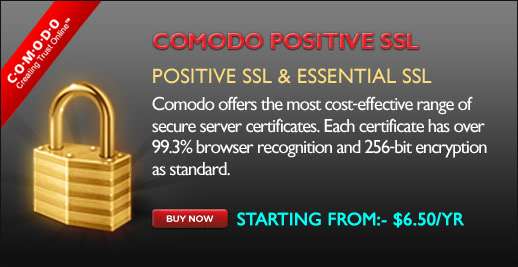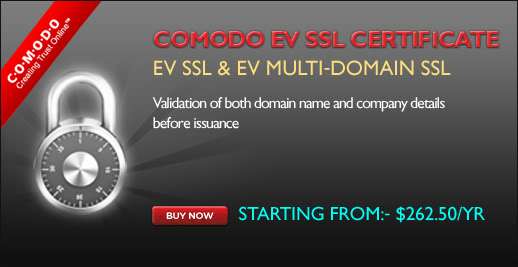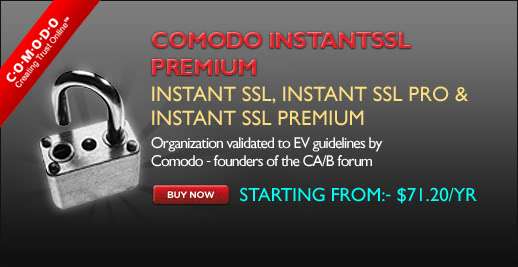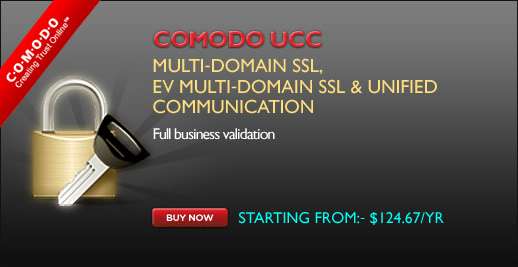
Positive SSL Certificates
Issued within 10 minutes, a Positive SSL Certificate provides a quick cost-effective solution to secure your customer transactions and sensitive information.

Comodo EV SSL
EV SSL Certificate provide the highest levels of encryption, security and trust. They immediately reassure web site visitors that it is safe to conduct online transactions by turning the address bar green.

Comodo InstantSSL Premium
An InstantSSL Pro Certificate enables you and your customers to complete transactions with the assurance that no one else can read or change information as it travels over the Internet.

Positive SSL Wildcard & Essential SSL Wildcard
Secure UNLIMITED subdomains on a single domain name with one Certificate. 128/256 bit industry standard SSL Certificate; Trusted by over 99.3% of current Internet users.

Unified Communication Certificate(UCC SSL)
Designed exclusively for MS Exchange and Office Communications infrastructures, Comodo UCC SSL allow a one SSL to provide SSL-secured communications for multiple domains and multiple host names.
Wednesday, February 24, 2016
And Here Comodo is Again #1 in SSL Market Share
Monday, May 4, 2015
Comodo increasing its market share
Usage of SSL certificate authorities for websites
- Logius
- OpenTrust
- Türktrust
- Camerfirma
- Buypass TWCA
- Hongkong Post
- Chunghwa Telecom
- Sertifitseerimiskeskus
- A-Trust
- Microsec
- CNNIC
- Japanese GPKI
- Izenpe
- Actalis
- Certigna
- IdenTrust
- CertSIGN
- WISeKey
- ACCV
- Disig
- NetLock
- E-Tugra
- Swisscom
- E-Guven
- Harica
Tuesday, March 24, 2015
Comodo is the Most Trusted Site Seal When Shopping Online - Survey
The Comodo organization, a global innovator and developer of cyber security solutions, today announced that new survey data shows that the Comodo security seal is the most trusted security seal in the world, for those shopping and conducting ecommerce transactions online.
| Image Source - https://www.surveymonkey.com/results/SM-Q85QCFS7/ |
Tuesday, February 17, 2015
Comodo Ranked Top Position in The Internet History
Comodo is used by 6.6% of all the websites, that is a SSL certificate authority market share of 33.6%.
- SwissSign
- Logius
- OpenTrust
- Türktrust
- Camerfirma
- Microsec
- Chunghwa Telecom
- Buypass
- Hongkong Post
- A-Trust
- Sertifitseerimiskeskus
- CNNIC
- TWCA
- Izenpe
- Japanese GPKI
- NetLock
- ACCV
- WISeKey
- Certigna
- IdenTrust
- CertSIGN
- Disig
- E-Tugra
- E-Guven
- Firmaprofesional
- TDC
Friday, December 6, 2013
Time to Upgrade: Convert 1024 Bit SSL to 2048 Bit SSL for a Cyber-Safe New Year
- First of all, check if your certificate is less
than 2048-bit key length. You can do that by clicking here Check your SSL
You are good to go if your certificate’s strength is 2048-bit or above, but if it’s not, you have to fix that. - Next step would be to find out if your server is compatible enough to handle a 2048-bit SSL certificate.
- You need to generate CSR to proceed further. Please follow this link which would guide you with CSR generation steps for each server: Click Here
- Final step would be to
Renew the certificates that expire before Dec 31 2013 with a 2048-bit SSL certificate.
Reissue the 1024-bit certificates that expire after Dec 31 2013 by ordering 2048-bit SSL certificate instead.
Friday, November 22, 2013
Time to Upgrade: Say Goodbye to 1024 bit SSL
Just go to the following page and you can generate a discovery report to see if their certs are 2048, and it’s free!
Wednesday, November 13, 2013
Cheap and High Quality: Not an Oxymoron at Comodo
However, if you’re using the certificate for intranet site you might be able to use a Domain Validated certificate or simply Organization Validation and save some money. You have to match your purchase to your needs.








